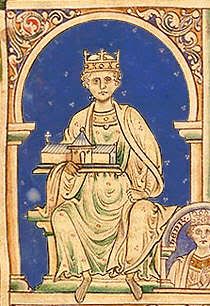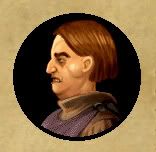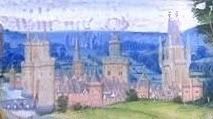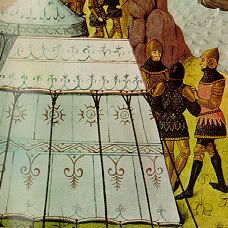In 1187, the relationship between Richard and his father King Henry II was stormy at best. Attempts to subdue Richard came to no conclusion and in a show of strength, Richard allied with the King of France, King Phillipe II. Richard and the French king came to be so close that they shared the same bed on at least one occasion. Whether this show of “unity” was political or romantic (or both) is not known for sure.
Whatever the case, Henry II was alarmed by the development. Attempts to lure Richard back to the mainland and away from his seat of power were met with mocking displays by Richard, who looted royal treasuries and fortified his own castles.
On the 15th of February, 1188, Richard had a letter dictated to his father in which he proclaimed Henry a false king. The
Lionheart Rebellion had begun. Duke Roger de Bigod was just one of many asked to present his armies to the king, and he did. The Welsh chronicler Walter Map mentions the Duke once in his work
De nugis curialium, claiming: “[Roger] was the most zealous of all of the king's vassals.”
In September of the same year, Roger had his barons assemble the armies of Norfolk which, on the mainland, was second only to the crown in strength.
On the 16th, Roger remained in the keep at Norwich. He stood below a 5 by 3 foot painting of himself. It was commissioned a year earlier and put together by a man claiming to have seen the lands around Jerusalem. In the painting, the Duke Roger stood upon a rocky outcrop and looked longingly upon the Holy City. In one hand was the snarling head of Salah ad-Din and in the other a sword raised high towards a golden cross in the sky.
He often tried to imitate this pose, and he did now. Though somehow he failed to live up to the grandiose rendition. Maintaining what he could of the position, he tilted his head back ever so slightly to achieve the highly noble posture, but the crown of Norfolk loosened and began to slide off his head. Fed up, he sighed and left.
His faithful servant, Edward Butler, waited for him.
Given the man's strict adherence to dietary modesty, most were dumbstruck as to how he became so morbidly fat. It did not matter in the end, as he was more pleasant company than most. A slight drizzle tickled their heads as they walked from the entrance of the keep to the wall of the motte.
“I believe we've been able to muster around 4,000,” Edward said to the Duke as they walked. “Few hundred knights...”
Roger nodded. “That sounds about right. I'll be setting out now.”
“Already?”
“Yes, but take note of this: I'm placing half the men in the command of the king and they shall head west to meet with him. I shall take the others across the Channel and meet up with 3,000 soldiers there. For the time being, I'll be representing the king in Aquitaine.”
“Of course!” Edward said. He questioned the details of everything commanded of him, smiling and nodding as he absorbed the information.
“Oh yes, and tell Isabelle I intend to send Hugh off to the keeping of the Archbishop in York when he's old enough,” Roger said. “See if that's to her liking.” With that he mounted a horse rode off towards a vast encampment that had sprung up outside Norwich. Edward gazed upon the departing Duke for only a moment before returning to the darkness of the castle.








